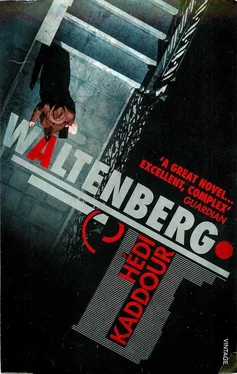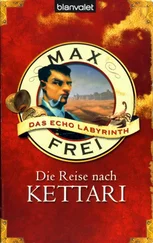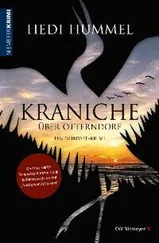Hedi Kaddour - Waltenberg
Здесь есть возможность читать онлайн «Hedi Kaddour - Waltenberg» весь текст электронной книги совершенно бесплатно (целиком полную версию без сокращений). В некоторых случаях можно слушать аудио, скачать через торрент в формате fb2 и присутствует краткое содержание. Год выпуска: 2009, Издательство: Vintage, Жанр: Современная проза, на английском языке. Описание произведения, (предисловие) а так же отзывы посетителей доступны на портале библиотеки ЛибКат.
- Название:Waltenberg
- Автор:
- Издательство:Vintage
- Жанр:
- Год:2009
- ISBN:нет данных
- Рейтинг книги:3 / 5. Голосов: 1
-
Избранное:Добавить в избранное
- Отзывы:
-
Ваша оценка:
- 60
- 1
- 2
- 3
- 4
- 5
Waltenberg: краткое содержание, описание и аннотация
Предлагаем к чтению аннотацию, описание, краткое содержание или предисловие (зависит от того, что написал сам автор книги «Waltenberg»). Если вы не нашли необходимую информацию о книге — напишите в комментариях, мы постараемся отыскать её.
Waltenberg
Waltenberg — читать онлайн бесплатно полную книгу (весь текст) целиком
Ниже представлен текст книги, разбитый по страницам. Система сохранения места последней прочитанной страницы, позволяет с удобством читать онлайн бесплатно книгу «Waltenberg», без необходимости каждый раз заново искать на чём Вы остановились. Поставьте закладку, и сможете в любой момент перейти на страницу, на которой закончили чтение.
Интервал:
Закладка:
‘Many things have passed away, but pretty women are always with us.’
There will be a large crowd, some men will even wear top hats in the sunshine, a vineyard with terraces of pink sandstone from Alsace or the Rhineland, a hill, the cortege winds along the flank of a hill in the autumn sun, climbs up to the forest, proceeds through the trees and past the low bushes, some eyes linger on the ferns, the leaves, here and there tints of gold and burnt ash, a spider’s web is for a moment caught in a noose of sun. Other eyes look out for unlikely mushrooms, then the cortege descends once more to the Rhine, behind the band, the plumed horses and the antique-style hearse.
All this is precisely why Max wants to be seen coincidentally by Hans’s side, now, in 1914, among the dragoons at Monfaubert who have just bound and gagged this enemy who shall be his friend. Max has grasped the bridle of a horse which has been rejected as being in no fit state to charge, the horse backs away; you can’t say that it refuses to be mounted, it’s an army horse, it tries to shy away without appearing to be looking for fresh grass, you never know; and at the same time it is already resigned to going into battle with a back that is a layer of pus and a rider he doesn’t know.
Max strokes the horse’s head.
Hans and him.
A coincidence.
One more, just like these millions of men coinciding in a war which they had opposed not all that long ago. And Max recalls that only a few months back he was fighting this war shoulder-to-shoulder with Jaurès and the socialists, a perfect coincidence with Hans who was doing exactly the same among the Germans. Coincidence was already there, and functioning, with each man trying to defend civilisation and culture by talking for hours on end in smoke-filled cafés, severally drinking schnapps or coffee laced with eau-de-vie, cheering the speakers, joining marches, convinced that the truth was emerging from the tramp of their feet, processing along boulevards gay with slogans and redolent of honest horse manure, buying newspapers which supported their ideas. Later they even left for the front for the same reasons, both wanting to defend civilisation once and for all against barbarism, we were the centre of the world.
The day war was declared, Hans and Max rushed out to march like everyone else, swept along like everyone else, one in Berlin, the other in Paris, by the same wave of coincidence and pride, each of them swept along by the wave and adding his own puny gravitational pull to the wave which sweeps them all along. Max even shouted:
‘Long live Poincaré!’
Ten days previously, along with millions of men, he had called him a warmonger and a murderer, and in the café he joined in with his friends chanting a demand that all the manure in the barracks be gathered into a heap and that, ‘in it, in the presence of all the troops and to the strains of a military band, the Colonel should plant the regimental flag!’
Gustave Hervé.
Then suddenly this great wave of men rushing to join the war to end war. Molecules feel the pull of the moon when tides are equinoctial. Few humans will remain standing on the sidelines like the man who was happy to note in his diary: ‘2 August 1914, Germany declares war on Russia. — Afternoon, went swimming.’
All the others are caught up in the swirl of molecules, swelling it and allowing themselves to be swept along behind the banners, waving their straw boaters, a hat for village dances, for pleasure, for summertime, what was it about the nonchalant swagger which a boater gives its wearer (in August, people would even stick them on cab-horses’ heads, with holes cut out for their ears), what was it about the lightness and faintly rustic origin of its texture, about its colour, a light cream set off by the black of the hatband, what exactly was it that prompted the jerky movement of the hand which hurled it in the direction of Berlin, Paris or Vienna, up into the sky which contained the great ideas, the great beliefs and the icons which made a man want to run hatless across fields and with one mighty bound land on the streets of the enemy’s capital? directly on to its streets, don’t laugh.
So off they went to war. For a while, Hans almost forgot the woman he so longed to see again, whom he would certainly see again, one day, by working on himself, on his body, on his soul, he would be a vastly better person than he was on the day that stupid business happened, the day they parted.
Weeks on the march, camps lasting no more than a night or two, a pace which emptied the thoughts out of a man’s head, then in this clearing the long halt, awaiting the crossing of the Marne and the final offensive, and then the woman came back.
Sometimes she surfaced in Hans’s sleep. The sensation of a body lying on his. He would wake, nobody there, but someone was there in the hollow of his shoulder, on his belly; she was there, the weight of a body on him, afraid of waking too fully, of feeling nothing, close your eyes, go back to dream, the warmth steals back over his chest and belly, something moves.
But if he really goes back to sleep, it ends. Other times, it would happen in broad daylight, in the bushes a few metres dead ahead of him, in an autumn dress of ochre and dark green, woven of fine wool, he felt her presence less intensely than when he was half asleep but he could see her more clearly, she walked towards him as she used to once, carrying flowers in her arms.
Then again it could be more conscious, Hans would begin talking to the woman and she would be where he decided she should be. She would reply, she was there just next to him, they stood watching the countryside together, she was holding flowers in her arms. He didn’t like flowers made up that way, people have such silly sentimental notions about bouquets of flowers. Now he could shed tears for them.
Then again she comes to me laughing, she is playful, she deliberately exaggerates the sway of her hips, when they went for walks it was always fine weather, but at times things turned stormy, the tone changed. Hans blames himself more and more, there’d been several incidents, but all the same those afternoons always turned out nice in the end. And here too, in the clearing, to smoke, to be himself, be alone by himself and sad.
At the same time, it could be very enjoyable to talk to her ghostly presence, to summon her, even if it turned out badly and she did not come. Then Johann would join him, together they would watch the rabbits’ bacchanalian antics and the constantly changing clouds. And in the lull which preceded the storm, Lena would come back.
French dragoons, four troops of them, acting on orders from General Maisonneuve, commander of the 3rd Cavalry Division, orders which had been issued to the 2nd Squadron of the 12th Regiment of Dragoons for an operation to reconnoitre and harass.
A Sherman-style operation, so named after the Union general during the American Civil War who disrupted the Confederate rear with his cavalry. His trademark was rails ripped from the track, heated until white-hot and wrapped around telegraph poles so that they could not be used again, the so-called ‘Sherman neckties’.
The dragoons headed north, beyond Soissons, a foray of more than 150 kilometres behind German lines. The motto of the 12th is ‘Contending for Glory!’
On this late afternoon, the tally notched up by Squadron Jourde, so called after its leader, is meagre. Morale is low. Going home without glory, mocked by the song of thrushes, without having disrupted anything at all, riding back through fields littered with French corpses still in heaps or laid out in lines, flesh swollen, uniforms stretched to bursting over bloated, grotesque bodies, black faces, black buzzing entrails, mouths like rolls of purple flesh. They make what use they can of the forest’s torpid shade, exhausted riders, three nights in a row without proper sleep, rocked by the motion of the horses, eyes fixed on the bobbing rumps ahead, sleep comes down on us like a fever, pinch yourself, talk to the man next to you, keep your voice as low as you can, sergeant-major I feel like a dumb animal, make the most of it, it helps you to put up with anything, sleep surges back, men slump forward, their chests touching their saddle-bags, they are ready to slide off their mounts, then they start, and the melancholy returns, as if it had been biding its time.
Читать дальшеИнтервал:
Закладка:
Похожие книги на «Waltenberg»
Представляем Вашему вниманию похожие книги на «Waltenberg» списком для выбора. Мы отобрали схожую по названию и смыслу литературу в надежде предоставить читателям больше вариантов отыскать новые, интересные, ещё непрочитанные произведения.
Обсуждение, отзывы о книге «Waltenberg» и просто собственные мнения читателей. Оставьте ваши комментарии, напишите, что Вы думаете о произведении, его смысле или главных героях. Укажите что конкретно понравилось, а что нет, и почему Вы так считаете.












